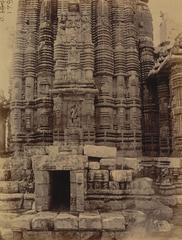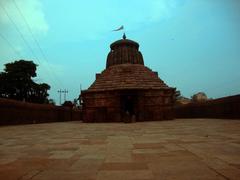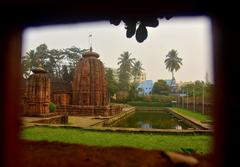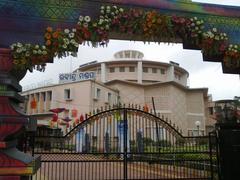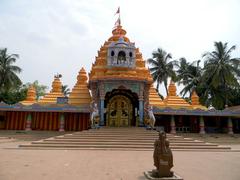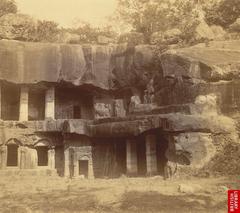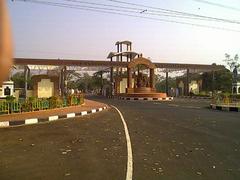Talesvara Siva Temple Bhubaneswar: Visiting Hours, Tickets, and Historical Significance
Date: 04/07/2025
Introduction
Nestled in the heart of Bhubaneswar’s Old Town, the Talesvara Siva Temple stands as a revered monument to Odisha’s Shaivite heritage and Kalinga architectural tradition. Dating to the 9th century CE, this temple is a living embodiment of the region’s religious, cultural, and artistic legacies. Modest in size but rich in historical and symbolic value, Talesvara Siva Temple offers a window into the spiritual traditions that have shaped the “Temple City of India.” This guide provides detailed information about the temple’s history, architecture, visiting hours, ticketing, accessibility, festivals, and practical travel tips to help you plan a meaningful visit.
Table of Contents
- Introduction
- Origins and Historical Context
- Architecture and Artistic Highlights
- Stewardship and Preservation
- Visiting Hours, Tickets, and Accessibility
- How to Reach and Travel Tips
- Rituals, Festivals, and Community Life
- Nearby Attractions and Suggested Itineraries
- Visitor Experience: Etiquette and Facilities
- Frequently Asked Questions (FAQs)
- Conclusion
- References
Origins and Historical Context
The Talesvara Siva Temple, sometimes referred to as Taleswara or Talesavara Siva Temple – II, was constructed in the 9th century CE during a prolific era of temple building under the Kalinga rulers. Located in Ekamra Kshetra, Bhubaneswar’s ancient temple nucleus, the shrine reflects the city’s rise as a hub of Hindu devotion and architectural innovation (Kevin Standage Photography; Wikipedia: List of Hindu temples in Bhubaneswar). This area is famed for its uninterrupted architectural evolution over two millennia, making it a treasure trove for historians and pilgrims alike (Kevin Standage Photography).
Architecture and Artistic Highlights
Structural Features
Built in the classic Kalinga style, the temple is primarily constructed from sandstone and follows the pancharatha plan, featuring five projections on each side. The main sanctum (deul) remains intact, though the traditional jagamohana (assembly hall) is missing—possibly due to either an original minimalist design or later destruction (Kevin Standage Photography). The sanctum faces east and is situated within a tranquil, well-maintained precinct.
Key Artistic Elements
- Navagraha Lintel: The sanctum doorway’s lintel features carvings of the eight planetary deities, omitting Ketu. This omission is significant for dating the temple, as later temples typically include all nine (Kevin Standage Photography).
- Shiva-Ekapada Iconography: On the north side, a rare one-legged Shiva (Ekapada) image can be seen—an unusual form in Odisha, adding to the temple’s scholarly interest.
- Decorative Motifs: Elements such as miniature rekha deuls (symbolizing Mount Meru), chaitya motifs, and relief pilasters reflect both Hindu and Buddhist artistic influences (Culture and Heritage).
Site Layout
The temple stands on a low platform, with the sanctum (5.45 m²) set 1.2 m below ground level, leading to water seepage during monsoons. The compound includes an ancient laterite-block well, and the site’s compactness enhances its serenity.
Stewardship and Preservation
Unlike many Bhubaneswar temples managed by government bodies, Talesvara Siva Temple is privately owned and maintained by the Bharati Matha, with stewardship provided by Pranava Kishore Bharati Goswami. This tradition of community-led care ensures that the temple remains a vibrant site of worship while also preserving its historical character (Wikipedia: Talesavara Siva Temple – II; Trek Zone). Periodic repairs, including upper-structure renovations, have been funded through community donations.
Visiting Hours, Tickets, and Accessibility
- Visiting Hours: 6:00 AM to 8:00 PM daily (certain sources note 6:00 AM to 7:00 PM or 6:00 PM closing; confirm with local contacts during festivals or maintenance periods).
- Entry Fee: Free for all visitors. Donations are welcomed for maintenance.
- Accessibility: Due to its ancient design, the temple has uneven terrain and steps, making access challenging for those with mobility issues. Assistance is recommended for differently-abled visitors.
- Dress Code: Modest attire is required (shoulders and knees covered). Shoes must be removed before entering the inner sanctum.
- Photography: Allowed in the outer precincts, but typically restricted inside the sanctum. Always ask temple staff for permission.
How to Reach and Travel Tips
- Location: Kedar Gouri Road, Old Town, Bhubaneswar.
- By Air: Biju Patnaik International Airport is approx. 5 km away.
- By Rail: Bhubaneswar Railway Station is about 3–4 km distant.
- Transport: Auto-rickshaws, taxis, and app-based ride services are easily available.
- Best Time to Visit: October to March offers pleasant weather. Avoid the monsoon due to water seepage concerns.
- Nearby Facilities: Basic amenities (water, restrooms) may be limited; carry essentials. Shops nearby sell puja items and snacks.
Rituals, Festivals, and Community Life
Daily Worship
The temple is an active site of Shaivite worship, with morning and evening aarti, abhisheka (ritual bathing), and offerings of flowers, bel leaves, and milk (Ease India Trip). The hereditary priests maintain Vedic chanting and traditional rituals, preserving Odisha’s temple culture.
Major Festivals
- Maha Shivaratri: Marked by night-long vigils, fasting, and special ceremonies, drawing large crowds.
- Shravan Mondays & Kartik Purnima: Feature ritual baths and elaborate pujas.
- Cultural Events: The temple also hosts traditional dance and music performances during festivals, supporting Odisha’s intangible heritage (Culture and Heritage).
Community Engagement
The temple is involved in social and charitable activities, including community kitchens (annadanam) and festival sponsorships, reinforcing its role as a community center.
Nearby Attractions and Suggested Itineraries
- Parasuramesvara Temple: 150 meters east, known for its early Kalinga architecture.
- Lingaraja Temple: Bhubaneswar’s largest Shiva temple (entry to main sanctum for Hindus only).
- Mukteswar and Rajarani Temples: Renowned for exquisite stonework and iconography.
- Bindu Sarovara: Sacred water tank surrounded by temples.
- Odisha State Museum & Ekamra Haat: For history and crafts.
- Udayagiri and Khandagiri Caves: Jain heritage sites 7 km away.
A half-day walking tour can cover most Old Town highlights.
Visitor Experience: Etiquette and Facilities
- Etiquette: Speak softly, avoid obstructing worshippers, and do not touch idols/ritual items unless invited.
- Facilities: Restrooms and drinking water may be limited; plan accordingly. Shops outside sell flowers and offerings.
- Safety: The area is generally safe, with heightened security during festivals. Keep personal belongings secure.
Frequently Asked Questions (FAQs)
Q: What are the Talesvara Siva Temple visiting hours?
A: 6:00 AM–8:00 PM daily (hours may vary during festivals).
Q: Is there an entry fee?
A: No, entry is free. Donations are appreciated.
Q: Is the temple accessible for differently-abled visitors?
A: Accessibility is limited due to steps and uneven surfaces; assistance is recommended.
Q: Are guided tours available?
A: Yes, local guides are available at the entrance or through hotels/agencies.
Q: When is the best time to visit?
A: October–March, especially during major festivals for a vibrant experience.
Q: Can non-Hindus enter the temple?
A: Non-Hindus are generally welcome in outer areas but may have restricted access to the inner sanctum during key rituals.
Conclusion
The Talesvara Siva Temple encapsulates Bhubaneswar’s unique blend of history, faith, and artistry. Its rare iconography, like the Shiva-Ekapada and incomplete Navagraha, combined with the community’s ongoing stewardship, make it an essential stop for anyone interested in Odisha’s temple heritage. Plan your visit during the cooler months, respect local customs, and enrich your journey by exploring nearby historic sites. For guided tours, interactive maps, and more travel tips, download the Audiala app or visit our website.
References
- Talesvara Siva Temple in Bhubaneswar: History, Visiting Hours, and Travel Tips, Kevin Standage Photography
- Talesvara Siva Temple – II, Wikipedia
- Talesvara Siva Temple Bhubaneswar: Visiting Hours, Tickets & Cultural Significance, Stamped Moments
- Architectural Features and Visiting Guide to Talesvara Siva Temple, Culture and Heritage
- Visitor Experience and Practical Information, Ease India Trip
- Talesvara Siva Temple – II, Trek Zone
- Exploring Bhubaneswar: The Enigmatic City of Ancient Temples in Odisha, Culture and Heritage
